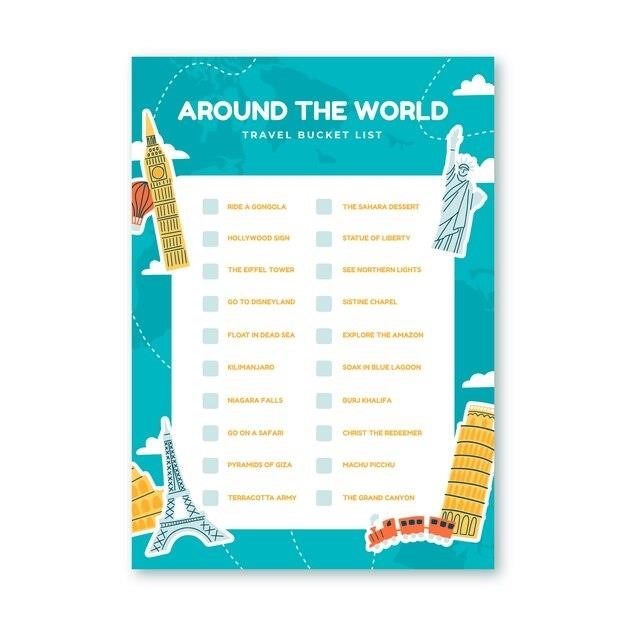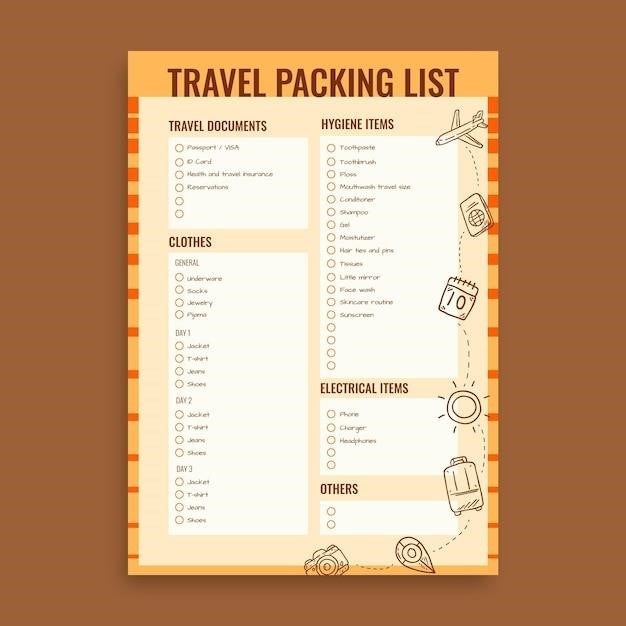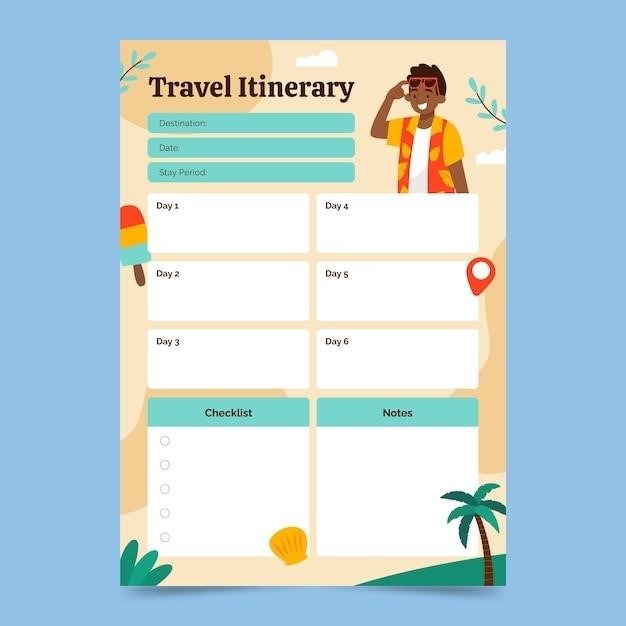Finding and Using “Travelers Form” PDFs in English
Locating English-language traveler forms online is crucial for smooth international travel. Many websites offer downloadable PDFs; ensure accuracy and completeness before submission.
Types of Travel Forms
Numerous travel forms exist, each serving a distinct purpose. Customs declarations, like the CBP Form 6059B, are vital for entering certain countries, detailing belongings and potential agricultural products. Travel health forms document vaccination records and health conditions, potentially required for entry or insurance purposes. Consent forms are essential for minors traveling internationally or under specific circumstances, ensuring parental or guardian approval. Other forms might include visa applications or travel insurance documentation, each tailored to specific needs and destinations.
Common Uses of Travel Forms
Travel forms serve various crucial functions. Customs declarations help expedite border crossings by providing necessary information to immigration officials. Travel health forms help healthcare providers understand a traveler’s medical history and potential risks, facilitating appropriate care if needed. Consent forms for minors provide legal authorization for travel, protecting children and offering peace of mind to parents. Insurance forms may be required to process claims in case of emergencies or unexpected events. Properly completed forms streamline the travel process, preventing delays and complications.
Where to Find English Language Travel Forms
Numerous online resources provide English-language travel forms. Government websites of your destination country often feature downloadable PDFs of necessary customs declarations and other official forms. Airline websites may offer forms for specific travel requirements, like visa applications or health declarations. Travel insurance providers frequently provide forms for submitting claims or requesting coverage. Specialized travel websites may offer links to relevant forms or provide guidance on finding them. Always verify the legitimacy of a website before downloading any documents.
Specific Examples of English Travel Forms
Examples include Customs and Border Protection forms (like CBP Form 6059B), travel health declarations, and travel consent forms for minors.
Customs and Border Protection Forms (e.g., CBP Form 6059B)
The U.S. Customs and Border Protection (CBP) utilizes Form 6059B for collecting essential traveler information upon arrival. This crucial document requests details about your identity, purpose of visit, and items you’re bringing into the country. Accurate completion is vital for a swift and trouble-free entry. Failure to complete it honestly and thoroughly may lead to delays or complications. The form inquires about agricultural products, wildlife items, and recent farm visits, all relevant to biosecurity measures. Downloading the English version from the CBP website beforehand is highly recommended for efficient processing at the border. Ensure you carefully read all instructions and provide truthful answers to all questions.
Travel Health Forms
Travel health forms are essential documents that gather information about a traveler’s health status before and during international trips. These forms, often required by specific destinations or airlines, help assess potential health risks and ensure appropriate medical precautions are taken. They typically request details regarding vaccinations, pre-existing medical conditions, recent illnesses, and medications. Accurate completion is paramount, as inaccuracies could lead to travel restrictions or delays. Some forms might include questions about potential exposure to contagious diseases or recent travel history. Always consult your doctor or a travel clinic for advice on necessary vaccinations and health preparations before filling out these forms. Many countries provide downloadable PDF versions of their health declaration forms online in English.
Travel Consent Forms (for minors or specific situations)
Travel consent forms are legally binding documents that authorize a minor or individual in a specific circumstance to travel internationally or domestically without a parent or legal guardian. These forms are crucial for situations where a child is traveling with a relative, friend, or school group, or when an individual requires special permission due to medical or legal reasons. They typically include details about the minor’s identity, travel dates, destinations, the name and contact information of the accompanying adult(s), and the parent’s or guardian’s explicit consent for the journey. Many organizations and embassies provide sample forms online, often available as downloadable PDFs in English. Always ensure the form adheres to legal requirements of the relevant jurisdictions involved. Failing to provide proper documentation could result in legal complications and delays.

Resources for Learning Travel-Related English
Numerous online courses, books, and workbooks offer vocabulary and phrases for travelers. These resources enhance communication skills for smoother trips abroad.
English Language Learning Materials for Travelers
Many resources cater specifically to travelers needing to improve their English. These materials often focus on practical vocabulary and phrases relevant to airport interactions, hotel check-ins, ordering food, asking for directions, and handling common travel situations. Look for materials that incorporate audio or video components to help with pronunciation and listening comprehension. Some materials might focus on specific travel situations, like navigating customs or dealing with emergencies. Interactive exercises and role-playing scenarios can also be beneficial in building confidence and fluency for real-world interactions. Consider the level of English you currently possess when choosing materials, ensuring a suitable challenge without being overwhelming. Supplementing learning with immersion experiences, like watching English-language movies or TV shows with subtitles, can further enhance your skills.
Online Courses and Resources
Numerous online platforms offer English language courses tailored for travelers. These courses often provide structured learning paths, interactive exercises, and opportunities for practice with native speakers. Many platforms offer free introductory modules or trial periods, allowing you to explore different teaching styles and approaches before committing to a paid subscription. Some websites specialize in travel-related English, focusing on vocabulary and phrases crucial for navigating various travel situations. Utilizing online resources can provide flexibility and convenience, allowing you to learn at your own pace and schedule. Look for courses with clear learning objectives, engaging content, and regular assessments to track your progress effectively. Interactive features, such as discussion forums and virtual classrooms, can enhance the learning experience by providing opportunities for interaction with other learners and instructors.
Books and Workbooks Focused on Travel Vocabulary
Supplementing online courses with dedicated travel English books and workbooks can significantly enhance vocabulary acquisition and practical application. These resources often include targeted vocabulary lists, grammar explanations, and practical exercises simulating real-life travel scenarios. Look for books that cover a range of travel-related topics, from airport procedures and customs interactions to ordering food and asking for directions. Workbooks frequently offer opportunities for self-assessment and reinforcement through quizzes, writing prompts, and role-playing activities. Choosing resources with audio components can improve pronunciation and listening comprehension, enhancing overall communication skills. Consider the book’s level and structure to ensure it aligns with your current English proficiency and learning goals. Supplementing with a comprehensive travel phrasebook can provide quick access to common phrases and expressions.

Understanding the Information on Travel Forms
Carefully review all instructions and questions on travel forms. Ensure accuracy and completeness of personal details and travel information for seamless processing.
Key Information Required on Most Forms
Most travel forms demand essential personal data⁚ full name as it appears on your passport, passport number, nationality, date of birth, and contact information. Crucially, they often require details about your trip, including dates of travel, destination country, purpose of visit (tourism, business, etc.), and flight or vessel information. Some forms may also ask about previous travel history, particularly if you’ve recently visited high-risk areas. Remember to accurately list any medications you’re taking, pre-existing health conditions, and emergency contact information. Failure to provide accurate and complete information could result in delays or complications with your travel plans. Always double-check for any discrepancies before submitting.
Interpreting Instructions and Questions
Carefully read all instructions and questions on the travel form. Many forms use specific terminology; if unsure about a question’s meaning, seek clarification from the issuing authority before submitting. Pay close attention to any specific formatting requirements, such as date formats (MM/DD/YYYY or DD/MM/YYYY) or preferred address styles. If a question asks for specific information (e.g., “purpose of visit”), avoid vague answers. Provide clear, concise, and accurate responses. If a question doesn’t apply to your situation, indicate this clearly using “N/A” or a similar designation as instructed. Do not leave any required fields blank unless explicitly allowed. Misinterpreting instructions can lead to delays or rejection of your form.
Ensuring Accuracy and Completeness
Double-check all information entered on the form for accuracy. Verify spellings, dates, passport numbers, and addresses. Inconsistent or incorrect information can lead to delays or rejection. Before submitting, review the completed form thoroughly. Compare the information entered against your supporting documents (passport, visa, itinerary). If you are unsure about a particular detail, it’s best to verify it with the relevant agency or contact person before submission. A complete and accurate form demonstrates your preparedness and respect for the process. Incomplete forms often require resubmission, causing unnecessary delays. Take your time to ensure thoroughness, avoiding rushed submissions.
Additional Tips for International Travel
Plan ahead, research visa requirements, and pack essential documents. Notify your bank of your travel plans to avoid card issues. Maintain copies of important documents separately from originals.
Pre-Trip Planning and Preparation
Thorough pre-trip planning is essential for a stress-free journey. Begin by researching your destination, including visa requirements, local customs, and currency exchange rates. Make copies of your passport, travel insurance policy, and other important documents. These should be stored separately from the originals, perhaps digitally or with a trusted person at home. Confirm flight and accommodation details well in advance, and consider travel insurance to protect against unforeseen circumstances. Pack appropriately for the climate and activities you’ll be undertaking, remembering to check baggage allowances. Familiarize yourself with local emergency numbers and healthcare facilities. Pre-downloading offline maps and translation apps can also be beneficial, ensuring you remain connected even without reliable internet access.
Emergency Contact Information
Providing readily accessible emergency contact information is vital for international travel. Share details of your itinerary with family or friends back home, including flight numbers, accommodation addresses, and planned activities. Ensure they have contact numbers for local emergency services in your destination country. Carry a small card with essential contact numbers – including your family’s contact information, your embassy’s emergency number, and local emergency services – and keep it separate from your main belongings. Consider registering with your country’s embassy or consulate abroad; they often provide assistance in emergencies. Inform your bank and mobile phone provider of your travel plans to avoid any issues with accessing funds or your phone service. Having a detailed list of allergies and medical conditions, along with contact information for your doctor, is also recommended.
Important Documents and Considerations
Before embarking on international travel, meticulously gather and organize all essential documents. This includes your passport (ensuring its validity extends beyond your return date), visas (if required), travel insurance details, flight/train tickets, and any necessary travel permits. Make photocopies of key documents and store them separately from the originals. Consider keeping digital copies in a cloud storage service, accessible even if your physical documents are lost or stolen. Familiarize yourself with the customs regulations of your destination country to avoid any issues upon arrival. Research local laws and cultural norms to ensure a respectful and smooth travel experience. Check for any travel advisories or warnings issued by your government concerning your destination. Remember to inform your bank about your travel dates to avoid any issues with your bank cards. Packing appropriately for the climate and planned activities will ensure a comfortable and enjoyable trip.
